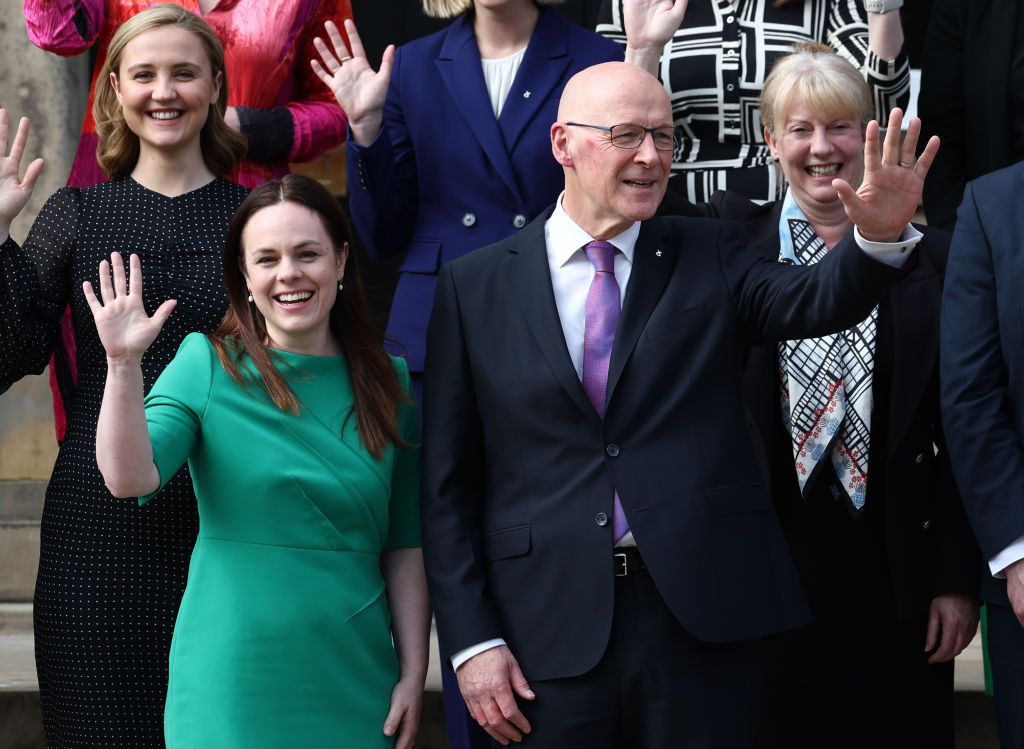John Swinney, Scotland’s new first minister, has appointed his inaugural cabinet – and it’s almost unaltered from the team headed by Humza Yousaf. The only real change is the appointment of former leadership hopeful Kate Forbes as deputy first minister. She was promised a ‘significant’ role and in addition to the office of DFM she will hold the economy portfolio.
Forbes’s return will be welcome news to those keen on healing internal rifts but will displease SNP progressives, who revile Forbes for her orthodox Christian views on same-sex marriage and gender identity ideology. She has called her new appointment ‘a moment of extraordinary privilege’ while Swinney has described her as ‘an immensely talented politician’. It doesn’t make up for how shabbily she was treated, which would have been roundly condemned if she belonged to any other faith, but the new post is an acknowledgement of her abilities and contribution to the SNP.
Beyond the addition of Swinney in the top job and Forbes as his number two, nothing else changes.
Shona Robison, deputy first minister and finance secretary under Yousaf, retains the finance brief. In a letter published today, she urged Swinney to make Forbes DFM for the sake for party unity. Yousaf ally and former MP Neil Gray remains health secretary while Jenny Gilruth, someone spoken of as a potential replacement for Yousaf, stays in post at education. Màiri McAllan, who previously served as a special adviser to Nicola Sturgeon and was fast-tracked into ministerial office, continues as cabinet secretary for wellbeing economy, net zero and energy.
SNP veteran Fiona Hyslop is kept at transport and Mairi Gougeon at rural affairs. Angus Robertson, a key figure in the post-Salmond SNP hierarchy, stays on as constitution, external affairs and culture secretary. Social justice secretary and an architect of the controversial Gender Recognition Reform Bill, since blocked by Westminster, Shirley-Anne Somerville continues in her role. Nationalist mainstay Angela Constance, promoted from drugs minister to justice and home affairs secretary when Yousaf took over from Sturgeon, will also be keeping her job.
With this almost shuffle-less reshuffle, John Swinney is sending two messages. The first is that there is new leadership at the top that balances the moderate centre-left and pro-business, pro-growth strands of SNP ideology. Under Yousaf and in the final years of Sturgeon, the Scottish government drifted too far to the left and, more damagingly, away from an agenda built around economics and public service delivery to one invested in identity politics and progressive cultural reforms. The latter were divisive inside the party, disliked by the public, and alienated some of the SNP’s traditional support. A Swinney-Forbes leadership is likely to return to ‘bread and butter’ concerns.
The second message is one of continuity. There has been altogether too much upheaval of late. Swinney is the SNP’s third leader and Scotland’s third first minister in a little over a year. Comparisons are beginning to be drawn between the formerly and famously ultra-disciplined SNP and the hectic reign of the Tories at Westminster. Swinney will want to defy such comparisons and keeping the government’s main cast in situ sends an early signal of his intentions. This note of continuity underscores how much concern there is in the Nationalist hierarchy about internal splits ahead of a general election.
A Swinney-Forbes leadership is likely to return to ‘bread and butter’ concerns
Personalities are important but we have yet to see how Swinney’s ascendancy affects policy. Retaining Yousaf’s cabinet will be characterised by opponents as an admission that Swinney will be more of the same, but if the SNP has a superpower it is the ability to morph ideologically if doing so is likely to serve the interests of the party and the cause. That cause – independence – has been on the back burner for some time, which is frustrating for true believers, but where much of the public wants it to remain for now. How Swinney manages the issue will be an early test of his leadership.
Swinney has already been SNP leader, an unhappy stint from 2000 to 2004. It was a tenure marred by division and ill-discipline within his MSP group. He has had 20 years, 16 of them as a senior cabinet minister, to mature as a politician and a leader. We will now see how much he has learned. But bringing Kate Forbes back in from the cold is a sign that the Swinney of 2024 is a cannier operator than the Swinney of 2004. He has identified the SNP’s biggest talent, a woman who can speak to voters otherwise unreachable by the party, and put her back at the top of government. There will be disquiet about that within the SNP but much more on the opposition benches.









Comments